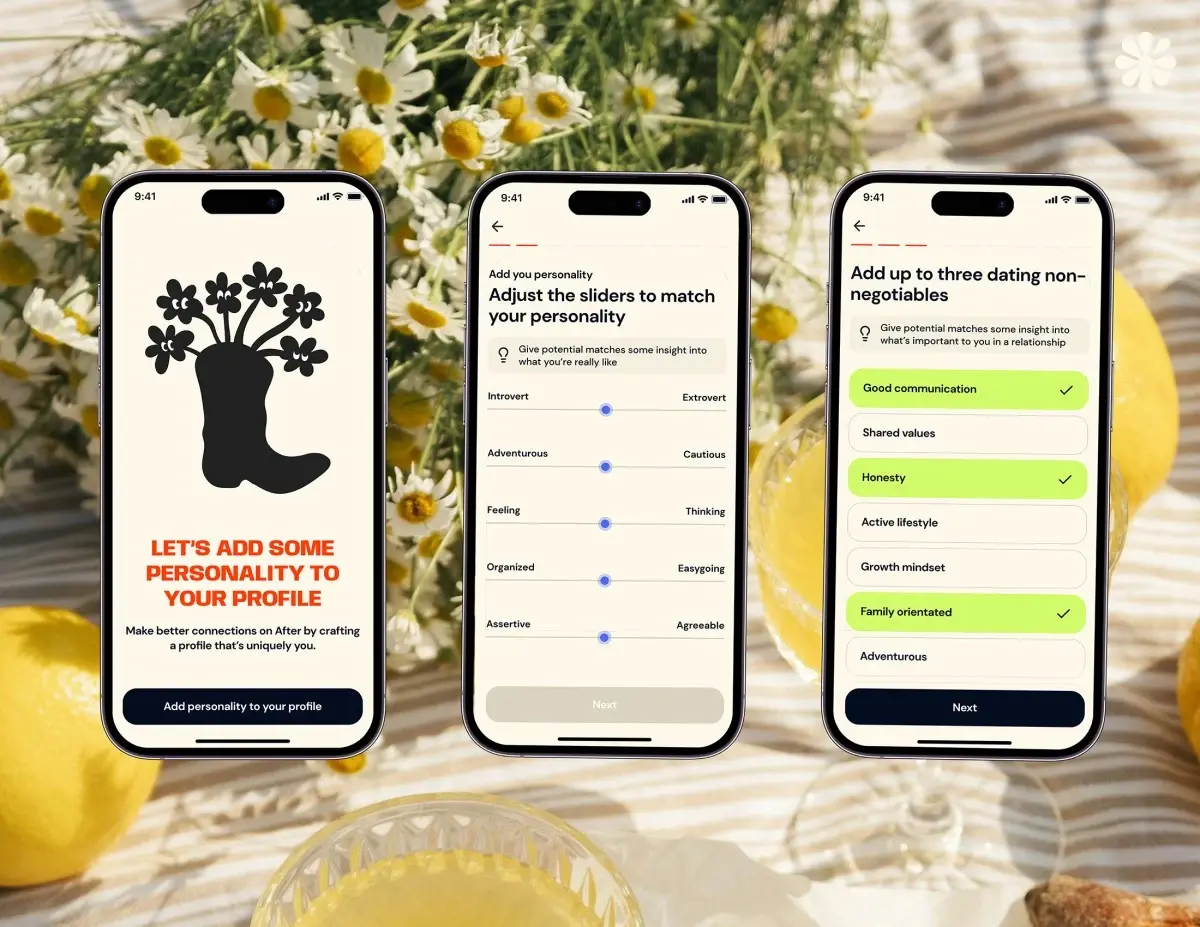a few interesting ideas in here, but also a few weird ideas and ideas i don’t think are going to work at all. (also i’m not sure it’s actually possible to build a “good” dating app.)
What sets the app apart from the rest of the dating app scene is that After requires users to share why they have unmatched a person before they are allowed to keep swiping. The idea behind the feature is to get rid of abrupt disconnections and confusion.
If two people match on After and start a conversation, but one person stops replying, they will be nudged to respond. If the person still doesn’t message the other user, the match expires. Before they can use the app’s features again, they need to choose a reason why they let the match expire.
Users can choose from a list of reasons to explain why they decided to stop responding. For instance, they can say distance was an issue or that the vibes didn’t match. After will then create a kind message and send it to the other person, and remind them that this isn’t a representation of who they are or their worth.
After will soon include opt-in mental health check-ins where you can reflect on your mood and feelings. And if the app thinks you have been using it too much, it will suggest that you take a break.
This sounds like a good idea on paper but will likely be terrible in real life. A lot of people ghost for their own safety. So many people have stories of dates turning nasty if they feel like they’re being rejected or criticized. Being forced to describe what you don’t like about the other person will not always end well.
You don’t have to tell the truth.
You don’t have to tell the truth.
Making it exactly like any other dating app.
But then what’s the point of the feature if no one is telling the truth?
Closure. People lie in real life too, not just on the internet.
I don’t understand why you’d want to see people lie to you. That just seems like a waste of everyone’s time to me.
deleted by creator
I don’t see how a polite lie is better no.
Because when ghosted, some people catastrophise. If it happens a lot they start to worry about what might be wrong with them. Our brains aren’t wired for it.
So, yes, sometimes a polite lie is better than nothing. Sometimes a polite lie is better than the truth. Its not you, its me.
If you’re doing it over an app, without the chance for the person you’re dumping to respond, I see no risk of things turning nasty
Except if the person decides to harass or stalk you in real life after reading the reasons. These aren’t hypotheticals, these things happen.
I don’t get how that’s going to help with multiple keys on my cheap keyboard not registering properly, when pressed at the same time.
IMHO, nKRO is the best solution to get rid of ghosting.
deleted by creator
I feel the same way
Removed by mod
I would have responded.
This app fundamentally misunderstands the problem. Your friend sets you up on a date. Are you going to treat that person horribly. Of course not. Why? First and foremost, because you’re not a dick. Your date is a human being who, like you, is worthy and deserving of basic respect and decency. Second, because your mutual friendship holds you accountable. Relationships in communities have an overlapping structure that mutually impact each other. Accountability is an emergent property of that structure, not something that can be implemented by an app. When you meet people via an app, you strip both the humanity and the community, and with it goes the individual and community accountability.
I’ve written about this tension before: As we use computers more and more to mediate human relationships, we’ll increasingly find that being human and doing human things is actually too complicated to be legible to computers, which need everything spelled out in mathematically precise detail. Human relationships, like dating, are particularly complicated, so to make them legible to computers, you necessarily lose some of the humanity.
Companies that try to whack-a-mole patch the problems with that will find that their patches are going to suffer from the same problem: Their accountability structure is a flat shallow version of genuine human accountability, and will itself result in pathological behavior. The problem is recursive.
Your friend sets you up on a date. Are you going to treat that person horribly. Of course not. Why? First and foremost, because you’re not a dick.
I have in my life met a number of people to whom you might want to explain that this was how they were supposed to behave.
I think you make a good point. But the tech doesn’t have to formalize or understand the complexities of human relations or state. The platform and environment are something you can shape even without an established or physical community. The way information is presented and interactions happen does influence how people use and communicate. Not reaching the same degree doesn’t mean it’s a complete failure.
Totally agreed. I didn’t mean to say that it’s a failure if it doesn’t properly encapsulate all complexity, but that the inability to do so has implications for design. In this specific case (as in many cases), the error they’re making is that they don’t realize the root of the problem that they’re trying to solve lies in that tension.
The platform and environment are something you can shape even without an established or physical community.
Again, couldn’t agree more! The platform is actually extremely powerful and can easily change behavior in undesirable ways for users, which is actually the core thesis of that longer write up that I linked. That’s a big part of where ghosting comes from in the first place. My concern is that thinking you can just bolt a new thing onto the existing model is to repeat the original error.
really good thoughts and write up that you linked, thanks
Glad to hear it!
So, the goal here is to prevent ghosting by making ghosting minutely costly to the ghoster.
They pick from an array of multiple reasons why, and the app formulates an exceptionally kindly worded explanation to send to the ghosted person.
I don’t see this as dangerous to people who are ghosting potentially dangerous people.
Instead of getting nothing, and formulating whatever cockamamie explanation in their own minds (or maybe just going ‘sigh, oh well’), they at least get a facsimile of closure from a canned response.
Obviously this does not magically solve the many problems of dating apps, but I fail to see how this is more dangerous than just ghosting on its own.
The problem is that its minutely time consuming to provide a ghosting explanation.
This ghost explanation requirement requires people to actually explain themselves, and that’s gonna be very cumbersome to people who are not really looking for a serious, long term relationship.
It makes it very annoying to use the app in a scattershot approach for rapid fire hookups, with tons of potentials on deck, as you’ll be forced to consistently ‘tend’ to all of your simultaneous matches, or drop them…
…and for people who think they’re looking for a serious, monogamous relationship, but consistently ghost people, it will basically cause uncomfortable cognitive dissonance when they realize they don’t like having to do a modicum if effort to explain why no one seems to meet their standards or is due their attention, even though they previously thought they were interested.
Basically, the problem I see with this app is that it forces users toward being honest with themselves.
This doesn’t seem like an app geared towards scattershot
So they got the expiring matches from Bumble, the personality test from Boo, and require you to select from a list of reasons why you unmatch someone like in every dating app out there. Am I missing something on how different this is from the other apps?
I don’t think this app is problematic. I think it’s attempting something interesting. Whether that will work or not will remain to be seen.
As with many “untested” dating app concepts; “May the user(/buyer) beware.” My advice to people who doubt the app is to ‘avoid it’. There’s plenty of valid reasons why you may feel that it won’t work. I’m not going to invalidate those feelings nor those experiences.
Enough people will vote with their feet; either by using it, using and quitting it, or not using it at all; that we will probably see within a few years if it works or if it quickly dies and languishes in obscurity.
I certainly wouldn’t mind seeing how well things performed in 5 years from now for this concept. I do feel it could help, especially if the boilerplate rejection text is designed intelligently enough. I certainly feel like enough people struggle with mental health that what they are trying to do could be beneficial to encouraging people not to act impulsively. I think providing mental health resources right there in the app may allow rejectees to seek help they need; instead of pinning their hopes on finding a potential mate to address their issues, then lashing out at, or stalking, those potential mates when they’re rejected.
To be clear; I do understand that many kinds of scary or bad experiences are a thing for some dating app users. I simply feel that, for those people who have not had such an experience and might feel safe or safer with such a messaging mechanic in a dating app; I do not see the harm in it.
At no point do I recommend this app anyone who feels that it’s unsafe to do anything but ‘ghost’ a bad match-up.
Please, do not try to change my mind.
deleted by creator
deleted by creator
You know those surveys that ask if you Agree, Strongly Agree, Disagree, Strongly Disagree? That kind of crap? Yeah, those don’t work. They’re idiotic, because your average person doesn’t really know which accurately reflects them and they gravitate towards what’s easier for them personally to respond with.
This will have a similar effect. Lots of people won’t give the accurate reason. They’ll give a comfortable reason.
I like that they are trying something new though. Critique certainly doesn’t mean don’t try it or don’t play with it.











